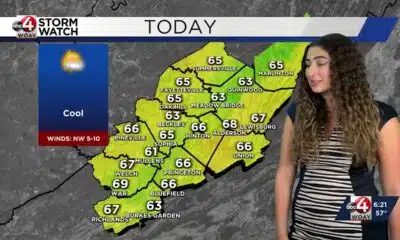News from the South - Arkansas News Feed
U.S. Supreme Court divided over Trump birthright citizenship ban, lower courts’ powers
by Ariana Figueroa, Arkansas Advocate
May 15, 2025
WASHINGTON — U.S. Supreme Court justices appeared split Thursday hearing a major case in which the Trump administration defended not only the president’s order to end the constitutional right to birthright citizenship but also its efforts to limit nationwide injunctions.
Though the dispute before the justices relates to the executive order on birthright citizenship that President Donald Trump signed on his Inauguration Day, the Trump administration is asking the high court to focus on the issue of preliminary injunctions granted by lower courts, rather than the constitutionality of the order.
It means that the Supreme Court could potentially limit the power of federal judges in district courts who curtail the president’s authority.
The Trump administration argues that a federal judge granting a nationwide injunction that blocks the federal government from carrying out its policy anywhere in the country is unconstitutional.
Rev. Patrick Mahoney, director of the Christian Defense Coalition, joined demonstrators outside the U.S. Supreme Court on Thursday, May 15, 2025, to protest the Trump administration’s effort to strip birthright citizenship from the Constitution. (Photo by Ashley Murray/States Newsroom)
The justices had before them three cases with injunctions levied by judges on Trump’s executive order to end birthright citizenship, from courts in Maryland, Massachusetts and Washington state. Under the 14th Amendment, all children born in the United States are considered citizens, regardless of their parents’ legal status.
Trump’s order, originally planned to go into effect Feb. 19, said that children born in the United States would not be automatically guaranteed citizenship if their parents were in the country without legal authorization or if they were on a temporary legal basis such as a work or student visa.
The justices questioned the practicality of a system in which judges can no longer issue nationwide injunctions and the logistics of instead having individuals file their own cases.
Liberal justice Elena Kagan said that would create a chaotic system, and conservative justice Neil Gorsuch said it would produce a “patchwork” of suits and noted how long it takes for a class — a group of affected people — to be put together for a court case.
Nationwide injunctions have stymied Trump’s agenda, but were also frequent during the Joe Biden administration. However, Trump has lashed out at judges who have blocked his actions, which in March prompted a rare response from conservative Chief Justice John Roberts on the importance of an independent judiciary.
‘Stateless’ children
If the Supreme Court, dominated 6-3 by conservatives, decides that nationwide injunctions are not allowed in the birthright citizenship cases, it would temporarily create a patchwork of citizenship rules varying from state to state while the cases are litigated. Liberal Justice Sonia Sotomayor said it would create a class of stateless people.
“Thousands of children who are going to be born without citizenship papers that could render them stateless in some places because some of their parents’ homes don’t recognize children of their nationals unless those children are born in their countries,” she said.
If birthright citizenship were to be eliminated, 255,000 children born each year would not be granted U.S. citizenship, according to a study by the think tank Migration Policy Institute.
40 injunctions since Jan. 20
Arguing on behalf of the Trump administration, U.S. Solicitor General D. John Sauer, in his opening remarks, noted that since Trump took office in January, there have been 40 nationwide injunctions.
“Universal injunctions exceed the judicial power granted in Article III, which exists only to address the injury to the complaining party,” he said, referring to the Constitution. “They transgress the traditional balance of equitable authority, and it creates a host of practical problems.”
Sauer touched on the merits of birthright citizenship, arguing that the 14th Amendment was only meant to grant citizenship to newly freed Black people, and not for immigrants in the country without legal authorization.
“The suggestion that our position on the merits is weak is profoundly mistaken,” Sauer said. “That kind of snap judgment on the merits that was presented in the lower courts is exactly the problem with the issue of racing to issue these nationwide injunctions.”
He said that the Trump administration would follow the high court’s ruling on birthright citizenship.
Demonstrators from the immigration advocacy organization CASA chant “Up up with liberation, down down with deportation” outside of the U.S. Supreme Court on Thursday, May 15, 2025, as justices heard oral arguments on the Trump administration’s legal challenge to birthright citizenship. (Photo by Ashley Murray/States Newsroom)
Sotomayor said that the Supreme Court has ruled four times to uphold birthright citizenship, starting in 1898, in United States v. Wong Kim Ark, in which the court ruled children born in the U.S. are citizens.
The justice that seemed most inclined to agree with Sauer’s argument was conservative Clarence Thomas, who noted the use of nationwide injunctions began in the 1960s and the U.S. has survived without them.
However, conservative Justice Samuel Alito criticized that district court judges “are vulnerable to an occupational disease, which is the disease of thinking that ‘I am right and I can do whatever I want.’”
Citizenship ‘turned on and off’
New Jersey Solicitor General Jeremy Feigenbaum, who represented the states that sought an injunction against the birthright citizenship order, laid out how the patchwork of citizenship means that citizenship would be “turned on” and off depending on state lines.
“Since the 14th Amendment, our country has never allowed American citizenship to vary based on the state in which someone resides, because the post-Civil War nation wrote into our Constitution that citizens of the United States and of the states would be one and the same without variation across state lines,” he said.
Immigrant rights’ groups and several pregnant women in Maryland who are not U.S. citizens filed the case in Maryland; four states — Washington, Arizona, Illinois, and Oregon — filed the case in Washington state; and 18 Democratic state attorneys general filed the challenge in Massachusetts.
Those 18 states are California, Colorado, Connecticut, Delaware, Hawaii, Maine, Maryland, Massachusetts, Michigan, Minnesota, Nevada, New Mexico, New Jersey, New York, North Carolina, Rhode Island, Vermont and Wisconsin. The District of Columbia and the county and city of San Francisco also joined.
Feigenbaum argued that the birthright citizenship case before the justices is the rare instance in which nationwide injunctions are needed because under a patchwork system, a burden would be created for states and local facilities such as hospitals where births occur.
“We genuinely don’t know how this could possibly work on the ground,” he said.
Protesters wave signs outside the U.S. Supreme Court on Thursday, May 15, 2025, in opposition to the Trump administration’s effort to strip birthright citizenship from the Constitution. (Photo by Ashley Murray/States Newsroom)
Kelsi Corkran, who argued on behalf of immigrant rights groups, said that the Trump order is “blatantly unlawful,” and that a nationwide injunction against the executive order was warranted.
“It is well settled that preliminary injunctions may benefit non-parties when necessary to provide complete relief to the plaintiffs or when warranted by extraordinary circumstances, both of which are true here,” she said.
Corkran is the Supreme Court director at Georgetown’s Institute for Constitutional Advocacy and Protection.
Lots of injunctions
The justices seemed frustrated with the frequent use of preliminary injunctions from the lower courts not only in the Trump administration, but others that occurred during the Biden administration.
Kagan noted that during the first Trump administration, suits were filed in the more liberal courts of California, and that during the Biden administration suits were filed in the more conservative courts in Texas.
“There is a big problem that is created by that mechanism,” Kagan said.
She added that it’s led to frequent emergency requests to the high court.
Conservative Justice Brett Kavanaugh agreed, and called it a “bipartisan” issue that has occurred during Republican and Democratic presidencies.
While the justices seemed concerned about the frequent use of nationwide injunctions, they also seemed eager to address the merits of the constitutionality of the birthright citizenship executive order that could potentially impact newborns.
Kavanaugh returned to the question of the logistics of birthright citizenship and how it would even be enforced.
He pressed Sauer on how hospitals and local governments would implement the policy and if they would be burdened.
“What would states do with a newborn?” Kavanaugh asked, adding that the executive order requires a quick implementation within 30 days.
Sauer said that hospitals wouldn’t have to do anything differently because the executive order directs the federal government to “not accept documents that have the wrong designation of citizenship from people who are subject to the (executive) order.”
Kavanaugh asked how the federal government would know who is subject to the order.
“The federal officials will have to figure that out,” Sauer said.
Any decision on the case will come before the Supreme Court’s July Fourth recess.
Last updated 2:09 p.m., May. 15, 2025
Arkansas Advocate is part of States Newsroom, a nonprofit news network supported by grants and a coalition of donors as a 501c(3) public charity. Arkansas Advocate maintains editorial independence. Contact Editor Sonny Albarado for questions: info@arkansasadvocate.com.
The post U.S. Supreme Court divided over Trump birthright citizenship ban, lower courts’ powers appeared first on arkansasadvocate.com
Note: The following A.I. based commentary is not part of the original article, reproduced above, but is offered in the hopes that it will promote greater media literacy and critical thinking, by making any potential bias more visible to the reader –Staff Editor.
Political Bias Rating: Center-Left
The content presents a detailed report on the U.S. Supreme Court case involving the Trump administration’s executive order on birthright citizenship. The language used reflects concerns from immigrant rights groups, liberal justices, and Democratic state officials about the potential impact of the executive order, with a focus on the legal, ethical, and social implications, including the risk of creating stateless individuals. The tone and framing lean toward defending birthright citizenship, as indicated by references to protests and criticisms of the administration’s stance. However, the article also includes perspectives from conservative justices, offering a balanced view of the legal arguments. Overall, the piece maintains a focus on the human and legal consequences, which aligns more with a center-left perspective on immigration and civil rights.
News from the South - Arkansas News Feed
‘This is what we all work for’: Longest term foster child in Arkansas adopted
by Ainsley Platt, Arkansas Advocate
August 25, 2025
Even the judge was smiling by the end of Cozy Dietrich’s adoption hearing.
Cozy had been in foster care longer than any other person in Arkansas’ foster system — until Monday morning, when Anna and Tim Dietrich of Little Rock adopted the nonverbal 19-year-old. He took his new family’s last name.
An atmosphere of joy dominated the small Pulaski County Circuit Court hearing room where his adoption was finalized. When Circuit Judge Tjuana Byrd Manning brought the hearing to a close, the celebration started. The lights dimmed, and court staff — Manning included — pulled out flashing, multi-colored lights as Justin Timberlake’s “Don’t Stop the Feeling” played over the courtroom’s speakers and the standing-room-only audience clapped and cheered.
For many, the celebration was warranted. Cozy entered foster care in October 2010, and has been available for adoption since October 2011, according to a Department of Human Services spokesperson. In all, Cozy spent nearly 15 years in Arkansas’ foster system.
Anna Dietrich said she and her husband had always been open to adopting, but had been waiting for the right person. Anna Dietrich has long worked within the state’s foster system as a logistics coordinator for Project Zero, an Arkansas nonprofit dedicated to placing every child in a loving, permanent home.
Cozy’s disabilities meant having a family “with understanding, patience, and love would be instrumental in supporting” him, according to his Project Zero Heart Gallery page. The Heart Gallery has profiles of adoptable children in Arkansas to help match them with adoptive families.
“To say yes to one was to say no to others,” Anna Dietrich said. “The Lord was going to have to make it clear who was ours. He’s just made it abundantly clear.”
Cozy is their first child.
The Dietrichs were clearly thrilled about the adoption. Anna could be seen beaming at her new son as he ate peanut butter crackers and communicated via hand signals with a companion in the front row of the small gallery before the adoption hearing started.
GET THE MORNING HEADLINES.
Newly-confirmed Department of Human Services Secretary Janet Mann also attended and choked up after the hearing when congratulating the Dietrich family.
“This is what we all work for,” she said. “This is the inspirational example of how every child deserves a family.”
Not every foster child goes up for adoption. According to Tiffany Wright, the director of DHS’ Division of Child and Family Services, the vast majority that enter the foster system return to their families, but roughly 200 are currently waiting for adoptive families.
In fiscal year 2023, the most recent year with available data, over 36,000 children nationwide remained in foster care despite being available for adoption, according to the National Council for Adoption. Of the more than 184,000 children who exited the nation’s foster care systems that year, 27% were adopted.
“Youth who enter care often endure trauma or have medical conditions that make finding a family hard, but we will never give up. We work to identify an appropriate family that can provide for a child in the long term. That’s what happened in today’s case,” Wright said.
Cozy’s adoption was also significant due to who his adoptive parents were.
“Anna has championed and featured children in the Heart Gallery, and works hard to find adoptive families for them,” Wright said. “There are countless children living happy lives with adoptive families across our state because of the work of Anna and Project Zero.”
Adopting a child isn’t as straightforward as filling out a form, Wright said. It’s a long process that involves home inspections, information sharing with interested families and transitional visits. Even when a suitable family is identified, adoptees also have to have lived with them for a certain period of time before the adoption can be finalized.
“You have to be in an adoptive home for six months, that’s typically the trigger that you can finalize the adoption,” Wright said.
YOU MAKE OUR WORK POSSIBLE.
Arkansas Advocate is part of States Newsroom, a nonprofit news network supported by grants and a coalition of donors as a 501c(3) public charity. Arkansas Advocate maintains editorial independence. Contact Editor Sonny Albarado for questions: info@arkansasadvocate.com.
The post ‘This is what we all work for’: Longest term foster child in Arkansas adopted appeared first on arkansasadvocate.com
Note: The following A.I. based commentary is not part of the original article, reproduced above, but is offered in the hopes that it will promote greater media literacy and critical thinking, by making any potential bias more visible to the reader –Staff Editor.
Political Bias Rating: Centrist
This content presents a straightforward, human-interest story focused on the adoption of a foster child and the efforts of individuals and organizations involved in the foster care system. It avoids partisan language or political framing, emphasizing compassion, community support, and the functioning of social services. The tone is positive and factual, appealing broadly without aligning with a particular political ideology.
News from the South - Arkansas News Feed
Health insurance will cost more for millions of Americans — especially rural residents
by Shalina Chatlani, Stateline, Arkansas Advocate
August 22, 2025
A combination of Trump administration policies will make health care coverage more expensive for people who purchase plans from health insurance marketplaces — and rural residents will be hit the hardest, according to a new analysis.
Researchers from the Century Foundation say Trump administration policies — especially its refusal to ask Congress to extend Biden-era tax credits that are set to expire at the end of this year — will boost out-of-pocket premiums by 93% in the 32 states that allow the federal government to operate their Affordable Care Act insurance marketplaces. New rules and tariffs will have a smaller impact.
Rural county residents in those states will see an increase of 107%, while residents of urban counties will pay 89% more, according to the analysis by the Century Foundation, a left-leaning research nonprofit.
Insurers participating in the Affordable Care Act marketplaces are proposing a median premium increase of 18% for 2026 — the biggest jump since 2018 and 11 points more than the growth from 2024 to this year. That bump would come on top of the increase resulting from the expiration of the tax credits and the other policy changes.
About 2.8 million people who are enrolled in marketplace plans in the 32 states live in rural counties, including 776,000 adults between the ages of 55 to 64 and more than 223,000 children, according to the Century Foundation.
“Rural residents tend to be older. They may be more likely to have chronic illness at the same time,” said Jeanne Lambrew, director of health care reform at the foundation. “It costs more, both because they have somewhat greater needs and less access to health care.”
The researchers calculated that average annual premiums for rural residents will increase by $760 — 28% more than the expected average increase for urban residents. States where rural enrollees are expected to see the highest cost increases are Wyoming ($1,943), Alaska ($1,835), and Illinois ($1,700).
Many of the states with a large number of rural residents have chosen not to expand Medicaid under the Affordable Care Act, meaning many people who earn between 100% and 138% of the federal poverty level, between $15,650 and $21,597 for an individual, get their coverage from an insurance marketplace, Lambrew said.
Of the seven states where 10% or more of rural residents are enrolled in marketplace plans (Alabama, Mississippi, Nebraska, North Carolina, South Carolina, Texas and Wyoming), only two — Nebraska and North Carolina — have expanded Medicaid.
State officials in Pennsylvania recently advised residents who use the marketplace that they should closely examine the plans that are available.
“This year, even more than previous years, Pennsylvanians should consider shopping around to find the best plans to meet their individual needs, at a price that makes sense for their current financial situation,” Pennsylvania Insurance Commissioner Michael Humphreys said in a statement released at the beginning of this month.
Lambrew said the increases will force many people to forgo insurance altogether.
“It’s harmful for those individuals in terms of their own health and life expectancy. It’s harmful for our providers, because they’re now dealing with people who are sicker and in the wrong settings, and it’s kind of expensive for our society,” Lambrew said.
“We know health insurance matters, so having these large potential increases on uninsured Americans is distressing.”
Stateline is part of States Newsroom, a nonprofit news network supported by grants and a coalition of donors as a 501c(3) public charity. Stateline maintains editorial independence. Contact Editor Scott S. Greenberger for questions: info@stateline.org.
Arkansas Advocate is part of States Newsroom, a nonprofit news network supported by grants and a coalition of donors as a 501c(3) public charity. Arkansas Advocate maintains editorial independence. Contact Editor Sonny Albarado for questions: info@arkansasadvocate.com.
The post Health insurance will cost more for millions of Americans — especially rural residents appeared first on arkansasadvocate.com
Note: The following A.I. based commentary is not part of the original article, reproduced above, but is offered in the hopes that it will promote greater media literacy and critical thinking, by making any potential bias more visible to the reader –Staff Editor.
Political Bias Rating: Center-Left
The content presents a critical view of Trump administration policies and highlights the negative impact on healthcare affordability, particularly for rural residents. It references analysis from the Century Foundation, a left-leaning think tank, and emphasizes concerns about the expiration of Biden-era tax credits and Medicaid expansion. While it focuses on policy effects without overt partisan language, the framing and sources suggest a center-left perspective that supports expanded healthcare access and government intervention to mitigate premium increases.
News from the South - Arkansas News Feed
New I-55 bridge between Arkansas, Tennessee named after region’s three ‘Kings’
by Sonny Albarado, Arkansas Advocate
August 21, 2025
A long-planned new Interstate 55 bridge connecting Arkansas and Tennessee will be known as Kings’ Crossing, officials from the two states announced this week.
The new name “honors three transformative figures known as ‘Kings’” — civil rights martyr Dr. Martin Luther King Jr., bluesman B.B. King and rock’n’roll star Elvis Presley, according to a press release from the Arkansas Department of Transportation. The project had been named “America’s River Crossing,” according to previous news releases. The Arkansas Highway Commission and Tennessee General Assembly officially adopted the new moniker.
The bridge will replace the existing 75-year-old Memphis-Arkansas Bridge that carries I-55 traffic between West Memphis and Memphis. The new bridge is being funded by $400 million from the federal Rebuilding American Infrastructure with Sustainability and Equity (RAISE) program and $200 million each from Arkansas and Tennessee, making it the single largest transportation investment in both states, according to the press release.
The narrow existing bridge will be replaced with a larger structure designed to meet modern seismic codes, as it sits on the New Madrid fault line, officials said.
“It’s only fitting to name this vital crossing after three historic figures from this region,” said ARDOT Director Jared Wiley. “It truly is the result of a regional effort that will benefit industry across this national corridor and the thousands of individuals who depend on this connection each day.”
Tennessee Department of Transportation Commissioner Will Reid said Kings’ Crossing is a “symbol of our collective history, heritage, and the enduring spirit of unity that defines this region. Naming this bridge in honor of these gentlemen pays tribute to their extraordinary legacies — individuals who transcended barriers, fostered cultural exchange, and used their talents to build bridges between people.”
The Federal Highway Administration has approved a draft environmental assessment for the project, and public hearings will be held in November, according to TDOT’s website.
Design is underway, and right-of-way coordination should begin later this year, according to ARDOT’s press release. Construction is estimated to start in fiscal year 2026.
For more information about the proposed project, visit TDOT’s website.
Arkansas Advocate is part of States Newsroom, a nonprofit news network supported by grants and a coalition of donors as a 501c(3) public charity. Arkansas Advocate maintains editorial independence. Contact Editor Sonny Albarado for questions: info@arkansasadvocate.com.
The post New I-55 bridge between Arkansas, Tennessee named after region’s three ‘Kings’ appeared first on arkansasadvocate.com
Note: The following A.I. based commentary is not part of the original article, reproduced above, but is offered in the hopes that it will promote greater media literacy and critical thinking, by making any potential bias more visible to the reader –Staff Editor.
Political Bias Rating: Centrist
The content presents a straightforward news report about the naming and construction of a new Interstate 55 bridge, highlighting bipartisan cooperation and honoring widely respected historical and cultural figures. It focuses on infrastructure development and regional collaboration without promoting a particular political ideology or agenda, reflecting a neutral and balanced perspective.
-
News from the South - Alabama News Feed7 days ago
U.S. agriculture secretary announces end to subsidies for solar panels on farmland
-
News from the South - Kentucky News Feed6 days ago
First of its kind clinical trial offers new hope for Kentuckians at risk of dementia
-
News from the South - Arkansas News Feed7 days ago
Cities across the US are embracing AI guidelines for local government workers
-
News from the South - Alabama News Feed6 days ago
Grants to boost local emergency alert systems in question as public media agency closes
-
News from the South - Arkansas News Feed6 days ago
‘Alligator Alcatraz’ probed by Dems as ICE detention centers multiply in states
-
Our Mississippi Home6 days ago
MSU Unveils Mixed-Use Development Featuring Boutique Hotel, Cultural Landmark
-
News from the South - Arkansas News Feed5 days ago
New I-55 bridge between Arkansas, Tennessee named after region’s three ‘Kings’
-
News from the South - Texas News Feed3 days ago
DEA agents uncover 'torture chamber,' buried drugs and bones at Kentucky home











































